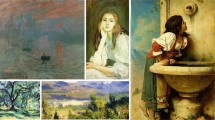Abstract
Everyday data is being produced at a mind-boggling rate and at current pace, we are generating more than 2.5 quintillion bytes of data each day. With more data, there comes the chance of generating and understanding more useful information out of it. With this view in mind, we are presenting our work on Quick Draw dataset. It is a repository of approximately more than 50 million hand-drawn drawings of about 345 different objects, contributed by over 15 million users. The work we have presented is a useful approach to perform a country-wise analysis of the styles that people use while making strokes to draw an object or image. Since we are dealing with a huge dataset, we are also presenting a powerful technique to effectively reduce the data and its dimension which results in much more simplified and concise data. Based on the simplified data, we are enhancing the performance of our models to recognize these hand-drawn objects based on the strokes that a user has used for drawing them. For the recognition of objects, we have worked on traditional machine learning models - Nearest Neighbor (K-NN), Random Forest Classifier (RFC), Support Vector Classifier (SVC) and Multi-Layer Perceptron model (MLP) by selecting the best hyper-parameters. To make the recognition results better, we have also presented our work on deep learning models - CNN, LSTM, and WaveNet networks.
Access this chapter
Tax calculation will be finalised at checkout
Purchases are for personal use only
Similar content being viewed by others
References
Stiny, G., Gips, J.: Shape grammars and the generative specification of painting and sculpture. In: IFIP Congress (2), vol. 2, no. 3, August 1971
Futrelle, R.P., Nikolakis, N.: Efficient analysis of complex diagrams using constraint-based parsing. In: Proceedings of 3rd International Conference on Document Analysis and Recognition, vol. 2, pp. 782–790. IEEE, August 1995
Bimber, O., Encarnacao, L.M., Stork, A.: A multi-layered architecture for sketch-based interaction within virtual environments. Comput. Graph. 24(6), 851–867 (2000)
Mahoney, J.V., Fromherz, M.P.: Three main concerns in sketch recognition and an approach to addressing them. In: AAAI Spring Symposium on Sketch Understanding, pp. 105–112, March 2002
Long, A.C., Landay, J.A., Rowe, L.A.: Quill: a gesture design tool for pen-based user interfaces. University of California, Berkeley (2001)
Gross, M.D., Do, E.Y.L.: Demonstrating the electronic cocktail napkin: a paper-like interface for early design. In: Conference on Human Factors in Computing Systems: Conference Companion on Human Factors in Computing Systems: Common Ground, vol. 13, no. 18, pp. 5–6, April 1996
Krizhevsky, A., Sutskever, I., Hinton, G.E.: ImageNet classification with deep convolutional neural networks. In Advances in Neural Information Processing Systems, pp. 1097–1105 (2012)
Girshick, R., Donahue, J., Darrell, T., Malik, J.: Rich feature hierarchies for accurate object detection and semantic segmentation. In Proceedings of the IEEE Conference on Computer Vision and Pattern Recognition, pp. 580–587 (2014)
Donahue, J., et al.: Decaf: a deep convolutional activation feature for generic visual recognition. In International Conference on Machine Learning, pp. 647–655, January 2014
Davis, R.: Position statement and overview: sketch recognition at MIT. In: AAAI Sketch Understanding Symposium (2002)
Suykens, J.A., Vandewalle, J.: Least squares support vector machine classifiers. Neural Process. Lett. 9(3), 293–300 (1999)
Zhang, M., Zhang, D.X.: Trained SVMs based rules extraction method for text classification. In: 2008 IEEE International Symposium on IT in Medicine and Education, pp. 16–19. IEEE, December 2008
Lau, K.W., Wu, Q.H.: Online training of support vector classifier. Pattern Recogn. 36(8), 1913–1920 (2003)
Breiman, L.: Random forests. Mach. Learn. 45(1), 5–32 (2001)
Keller, J.M., Gray, M.R., Givens, J.A.: A fuzzy k-nearest neighbor algorithm. IEEE Trans. Syst. Man Cybern. 4, 580–585 (1985)
Beyer, K., Goldstein, J., Ramakrishnan, R., Shaft, U.: When is “nearest neighbor” meaningful? In: Beeri, C., Buneman, P. (eds.) ICDT 1999. LNCS, vol. 1540, pp. 217–235. Springer, Heidelberg (1999). https://doi.org/10.1007/3-540-49257-7_15
Dudani, S.A.: The distance-weighted k-nearest-neighbor rule. IEEE Trans. Syst. Man Cybern. 4, 325–327 (1976)
Jain, A.K., Mao, J., Mohiuddin, K.M.: Artificial neural networks: a tutorial. Computer 29(3), 31–44 (1996)
Kim, Y.: Convolutional neural networks for sentence classification, August 2014. https://arxiv.org/abs/1408.5882
Zhang, X., Zhao, J., LeCun, Y.: Character-level convolutional networks for text classification. In: Proceedings of Advances in Neural Information Processing Systems, pp. 649–657 (2015)
Xiao, Y., Cho, K.: Efficient character-level document classification by combining convolution and recurrent layers, February 2016. https://arxiv.org/abs/1602.00367
Hochreiter, S., Schmidhuber, J.: Long short-term memory. Neural Comput. 9(8), 1735–1780 (1997)
Du, Y., Wang, W., Wang, L.: Hierarchical recurrent neural network for skeleton based action recognition. In: Proceedings of the IEEE Conference on Computer Vision and Pattern Recognition, pp. 1110–1118 (2015)
Paine, T.L., et al.: Fast wavenet generation algorithm (2016). arXiv preprint arXiv:1611.09482
Oord, A.V.D., et al.: WaveNet: a generative model for raw audio (2016). arXiv preprint arXiv:1609.03499
Cao, Y., Wang, H., Wang, C., Li, Z., Zhang, L., Zhang, L.: MindFinder: interactive sketch-based image search on millions of images. In: Proceedings of the 18th ACM International Conference on Multimedia, pp. 1605–1608. ACM, October 2010
Paulson, B., Eoff, B., Wolin, A., Johnston, J., Hammond, T.: Sketch-based educational games: drawing kids away from traditional interfaces. In: Proceedings of the 7th International Conference on Interaction Design and Children, pp. 133–136. ACM, June 2008
Author information
Authors and Affiliations
Corresponding author
Editor information
Editors and Affiliations
Rights and permissions
Copyright information
© 2019 Springer Nature Switzerland AG
About this paper
Cite this paper
Gupta, M., Mehndiratta, P. (2019). Analysis and Recognition of Hand-Drawn Images with Effective Data Handling. In: Madria, S., Fournier-Viger, P., Chaudhary, S., Reddy, P. (eds) Big Data Analytics. BDA 2019. Lecture Notes in Computer Science(), vol 11932. Springer, Cham. https://doi.org/10.1007/978-3-030-37188-3_22
Download citation
DOI: https://doi.org/10.1007/978-3-030-37188-3_22
Published:
Publisher Name: Springer, Cham
Print ISBN: 978-3-030-37187-6
Online ISBN: 978-3-030-37188-3
eBook Packages: Computer ScienceComputer Science (R0)




